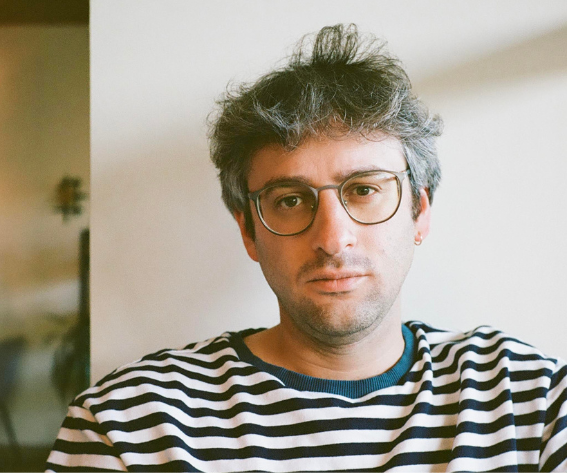It’s been really tight this March. With so many outstanding entries for Film of the Month, we here at TMFF had a lot of debates, often contradictory, before we finally determined the grand winner: Loss of Reality, an excellent Austrian short. Therefore, we asked director Martin Holper to have a little chat with us, and he kindly agreed.
JL: Congratulations for your great achievement, Martin. That’s another accolade to add to your film’s ever growing list of awards!
Martin: Many many thanks! In fact, “Loss of Reality” got its first laurel wreaths at the Tmff Montly Film Festival. And for that I am eternally grateful to you! It feels good to receive confirmation that all the hard work has paid off. I look forward to the future and hope that the film can prove itself at other festivals.
JL: How happy are you with the final result? How does it compare to your pre-shooting expectations?
Martin: For that, that this is my first short film, I’m very happy with it. Of course you do not always get everything the way you would expect it to be before shooting. That was one of the hard lessons I had to learn as a prospective director. A lot can go wrong on a set. As a director, you must have the ability to react quickly, rethink, and be ready to change your original version. But I think the big ones have the same problems. It gives me some comfort and at the same time gives me courage. I can look back on three years of hard work and can proudly say: Yes, I’m very happy with the result.
JL: How did you get the idea behind Loss of Reality? Did you start with the topic of drugs, or the story and central character?
Martin: First of all, I started to work on a concept that, on the one hand, harmonizes with the subject of short films, is exciting and also contains a statement behind it. So I came to the story of Loss of reality. At first, I wrote the script without really knowing what was coming. A simple idea became a very complex topic. I started researching the subject and also had some discussions with drug addicts. Surprisingly, I found a lot of positive affirmation about my story because I thought it would be way too fantasy-driven or maybe even over-the-top. In fact, those affected have told me that they have also experienced trips where they were taught to change their lives. Then I was simply Perplex. Feeling that I was on the right track, I kept on tweaking the script. For many, there was no background or stroke of fate about why they were using drugs. A wrong friendship circle is already enough for the most part. Unfortunately that is the hard reality.
The actors mostly have a Turkish / Kurdish migration background. As well as the main actor (Great performance I love you Onur!). In most cases, actors with a migration background in Austria are cast in films dealing with topics such as racism or deportation. Or stuck in clichéd roles like the kebap salesman, the rebellious Turk or the taxi driver. I chose it because I wanted to give them the chance to present themselves from another side. And they did that excellently! I’m so proud of all my actors!
JL: I always considered Requiem for a Dream as the complete experience when it comes to the topic of drug use aftermath. Few other projects tackling this topic manage to add anything valuable – however, your film stands out positively in this regard. How have you managed to achieve that?
Martin: Drugs have often been featured in films, but I do not think the narrative style of these films was staged in the right format, and it did not get stuck with young viewers. It has always been my goal to make a film about drug abuse that is “more accessible” to young people. The story of Momo, who only learns to let go of drugs in his intoxication, was very interesting. I put a lot on entertainment in the movie, which is partly carried by imaginative bizarre as well as humorous scenes. Where the topic of drug abuse is not glorified. Ironically, the protagonist experiences the self-knowledge of having to change his life in the intoxication of his drug trip. An odyssey through his innermost self, provided with an exciting atmosphere and underlined with visually stunning pictures is something for the young audience. I also received the most positive response from young people, which made me very happy. I reached my goal.
JL: For us, your use of humour and intertextuality really sealed the deal. How important were these elements in the storytelling process?
Martin: Very important. Since this was my first script as well, I tried to internalize everything important about script writing with the help of textbooks. Intertextuality was a topic that I was always fascinated by, and I really wanted to include elements of it in the script. In terms of humor, I really wanted to capture the zeitgeist of the young people. I’m only 33, but call myself already as an old dog. I have many friends who are a lot younger than me and spend a lot of time together. So I was able to pick something up from their humor and their way of speaking. But let’s face it, as a storyteller, you’re an adult who revives your inner child. From that point it was rather easy for me to let the humor work. That’s why I like making movies so much. You can be a child with impunity.
JL: You also won our Director of the Month award – congrats! What is your main takeaway from this project? An important learning point that will make you an even better director in the future?
Martin: Definitely! I still can not believe that I won this award. Thanks a lot for this! The process of making the film lasted for three years. There were many obstacles to overcome. There was also a time when even the entire project was temporarily in jeopardy because we ran out of budget. It’s not always easy, especially for actors and crew members who are almost in the dark, as they are going on with the project. This involves a lot of fingertip feeling to motivate people. Yes, especially dealing with the people is something I will take with me for future projects. I was once told: “On your set Martin, it is very familiar.” I was very happy! On the one hand, despite all the problems we had, I am also very happy that the project went over three years. So I had enough time to work on myself and develop my skills. I used the time and dealt a lot with editing, composition, acting and film theory. Loss of reality would probably not have the same effect today if I had not had so much time. I am constantly working on myself, growing from project to project. After each project, I take a newly learned small part with me.
JL: What’s your advice for wannabe filmmakers who want to make their voice heard and get their message across?
Martin: Never give up. Do not let anything persuade you and do not let you get under. You have an idea? Great! Go out and do it. Gather all your friends, pick up the camera and boom pole and off you go. At some point you are so far with your abilities that even the big ones will become aware of you. It’s a tough job and there are many jealous people. Or “Nein sager”, naysayers, as Arnold Schwarzenegger aptly put it. Keep fighting! Believe in you and you will succeed!
JL: Thanks a million for your interesting insights, Martin! We wish you the best of luck for the future, and hope to see your name in our festival again soon.
Martin: I thank you with all my heart at the Tmff! You are a wonderful festival and I would be very happy if we would meet again soon with a new project. All the best!









Leave a reply